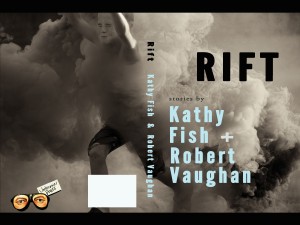Robert Vaughan will be reading all submissions received February 15-21. The writer whose story he chooses for publication will receive a free copy of RIFT by him and Kathy Fish.
Something I find really interesting and admirable about Rift is how ego-free it is. It’s sometimes very easy to lose track of who is the author of which story. What made you and Kathy (and Bud Smith) decide to lay out the book this way?
Thanks for your insights about the way RIFT was created, and the layout. As with any compilation, flexibility is key, and this is absolutely what it took to assemble the final book. Kathy Fish and I worked together to co-ordinate the four sections, to create a seamless flow, and to weave the stories together. As our publisher, Bud (Unknown Press) really trusted our instincts and gave us free rein over content.
One of your stories I really admire in RIFT is “Cosmos in Aspen.” I’ve re-read that story multiple times now and what keeps pulling me back is the mix of desire, grief, and strong imagery. You actively resist telling us the specifics of Patricia’s death, but clearly show us someone in the aftermath of a partner’s death: a little drunk and missing sex. Why did you choose this particular moment in that character’s life?
This is a terrific question! I think life and death go hand-in-hand, and that grief, a particularly powerful emotion, often arises, or is triggered while one is participating in a simple act like partying with friends, or on vacation in the most exotic locale. I was trying to fit all of that into a short piece.
I really liked the structure of “The Rooms We Rented.” It feels like we’re going through a very quick slide show of this couple’s relationship. What are some modular  stories (flash or otherwise) that you think are other successful examples of writing in that format?
stories (flash or otherwise) that you think are other successful examples of writing in that format?
I remember reading Brandi Well’s “A Dozen Notes to Ruben” in Please Don’t Be Upset and other stories (originally published at decomP) and thinking how did she do that? Also, “Undone” by Karen Stefano (The Secret Games of Words) is terrific. And Gertrude Stein’s Tender Buttons. And Anais Nin’s House of Incest.
What is your definition of flash fiction? What are your expectations for it versus reading a traditional 12-20 page story?
I define flash fiction as short fiction or compressed fiction. Simply shorter short stories. I try not to read flash fiction with any expectation (not always easy!) but the aspects I appreciate most are tension or conflict, lack of resolve, an efficient use of “white space” (what is left off the page is equally important to what words are selected). For personal preference, I also like darkness, and edginess. Playfulness of language, the element of surprise.
What advice would you give to someone trying to create a strong character in 500 words or less?
Read as much flash fiction as you can. Write a flash piece (or two, three?) daily. Pay less attention to how “good” it is, and simply DO IT! A writer’s greatest sense is their hearing. Listen to others intently. Eavesdrop at local cafes and restaurants. Journal. Never give up! Sketch characters in journals. Save examples of your favorite flash pieces each year. Track four or five of your favorite flashers, and see where they are getting published, or read their collections.


 The core workshop of SmokeLong Fitness is all in writing, so you can take part from anywhere at anytime. We are excited about creating a supportive, consistent and structured environment for flash writers to work on their craft in a community. We are thrilled and proud to say that our workshop participants have won, placed, or been listed in every major flash competition. Community works.
The core workshop of SmokeLong Fitness is all in writing, so you can take part from anywhere at anytime. We are excited about creating a supportive, consistent and structured environment for flash writers to work on their craft in a community. We are thrilled and proud to say that our workshop participants have won, placed, or been listed in every major flash competition. Community works.